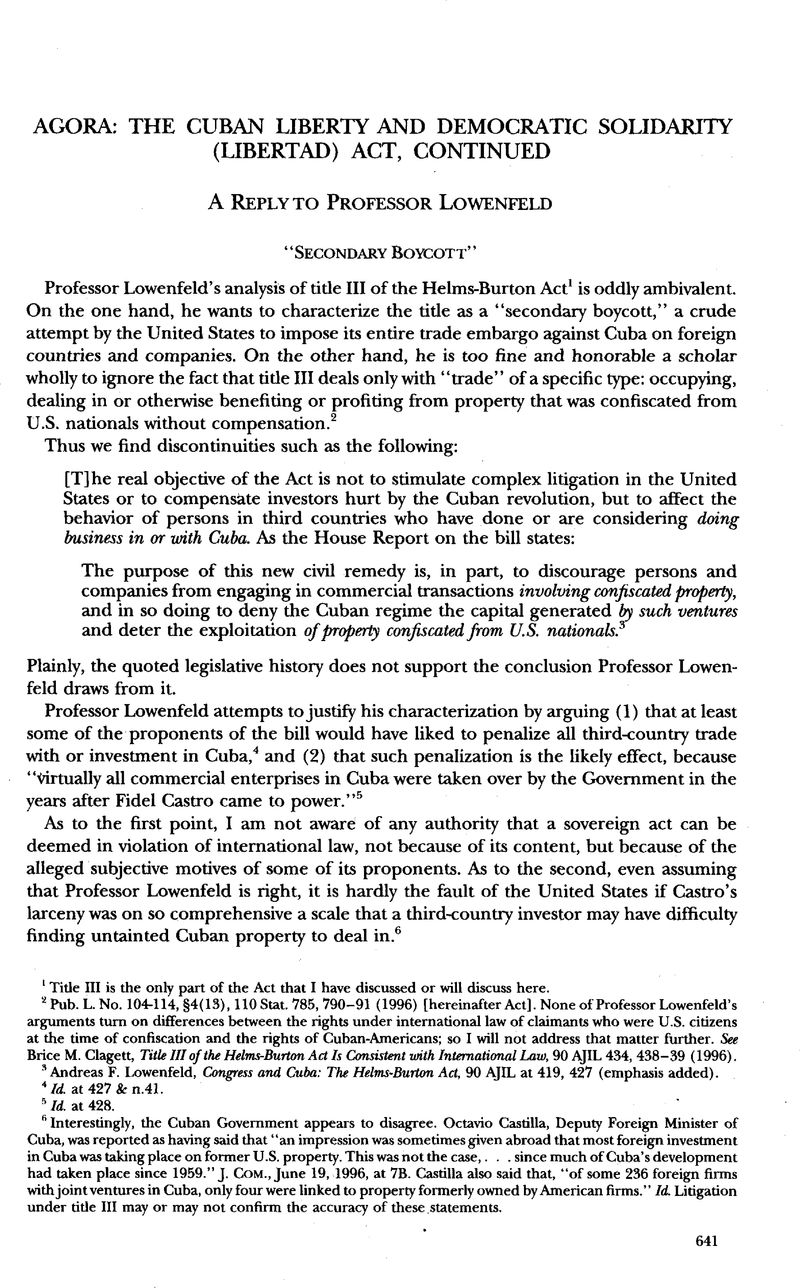No CrossRef data available.
Published online by Cambridge University Press: 27 February 2017

Mr. Clagett and his firm advise clients concerning title III of the Helms-Burton Act.
1 Title III is the only part of the Act that I have discussed or will discuss here.
2 Pub. L. No. 104-114, §4(13), 110 Stat. 785, 790–91 (1996) [hereinafter Act]. None of Professor Lowenfeld’s arguments turn on differences between the rights under international law of claimants who were U.S. citizens at the time of confiscation and the rights of Cuban-Americans; so I will not address that matter further. See Brice M. Clagett, Title III of the Helms-Burton Act Is Consistent with International Law, 90 AJIL 434, 438–39 (1996).
3 Andreas F. Lowenfeld, Congress and Cuba: The Helms-Burton Act, 90 AJIL at 419, 427 (emphasis added).
4 Id. at 427 & n.41.
5 Id. at 428.
6 Interestingly, the Cuban Government appears to disagree. Octavio Castilla, Deputy Foreign Minister of Cuba, was reported as having said that “an impression was sometimes given abroad that most foreign investment in Cuba was taking place on former U.S. property. This was not the case, … since much of Cuba’s development had taken place since 1959.” J. Com., June 19, 1996, at 7B. Castilla also said that, “of some 236 foreign firms with joint ventures in Cuba, only four were linked to property formerly owned by American firms.” Id. Litigation under title III may or may not confirm the accuracy of these statements.
7 90 AJIL at 430.
8 50 U.S.C. app. §2402(5) (A) (1994). One will search in vain through the Export Administration Amendments of 1977, Pub. L. No. 95–52, 91 Stat. 235, and, I believe, their legislative history for any claim by the United States that the Arab boycott violates international law.
9 Letter of Ambassador Jean-Pierre Leng, Permanent Representative of the European Commission, and Ambassador Giuseppe Baldocci, Permanent Delegation of Italy, to Ambassador Booth Gardiner, Permanent Representative, Permanent Mission of the U.S. Trade Representative (May 3, 1996).
10 Those treaties do create mechanisms that may provide critics with the means to obtain arbitral resolution of their claims, including the claim that title III violates customary international law. The United States will presumably present vigorous defenses to such contentions, and it may also have counterclaims to assert. A government that aids and abets its citizens’ trafficking in property that was confiscated in violation of international law has arguably itself violated international law, and therefore NAFTA or GATT. And a “claw-back” statute such as Canada has said it will enact, see Office of the Minister of Foreign Affairs, Press Release No. 115, Government Announces Measures to Oppose U.S. Helms-Burton Act (June 17, 1996)—providing for recovery by Canadians in Canadian courts of any amounts awarded to successful U.S. plaintiffs under title III—would surely violate various provisions of NAFTA if tide III itself is lawful.
11 See Clagett, 90 AJIL at 436.
12 Lowenfeld, 90 AJIL at 431.
13 Clagett, 90 AJIL at 435. Professor Lowenfeld’s assertion of a “thirty-six-year interval between conduct and effect,” 90 AJIL at 431, is likewise wide of the mark. Castro embarked on his program of seeking foreign investment only after the fall of the Soviet Union, in an attempt to replace his lost subsidies. Title III is a timely response to a new situation.
14 90 AJIL at 431.
15 See, e.g., United States Diplomatic and Consular Staff in Tehran (U.S. v. Iran), 1980 ICJ Rep. 3 (May 24).
16 Obviously, distinctions between the Vietnamese and Cuban situations might be warranted: there could be challenges to the validity of the French tides, and issues deriving from the law of war and the circumstances of the French departure from Vietnam might be relevant.
17 Act §302(a)(1), 110 Stat, at 815.
18 Early versions of tide III were not Cuba-specific but would have authorized lawsuits against traffickers in property confiscated from U.S. nationals anywhere in the world. E.g., S. 381, 104th Cong., 1st Sess., §302 (introduced Feb. 9, 1995). After opponents offered a parade of horribles (former Palestinians suing Israel was probably especially effective), the tide was cut back to deal, like the rest of Helms-Burton, with Cuba only. It was prudent for Congress to limit its first step to the concrete situation before it at the time. Globalization of the remedy may be deemed appropriate in the future if experience under tide III so warrants.
19 Act §302(a)(6), 110 Stat, at 817.
20 Lowenfeld, 90 AJIL at 427.
21 See Clagett, 90 AJIL at 440 & nn.32, 33.
22 See, e.g., William S. Dodge, The Historical Origins of the Alien Tort Statute: A Response to the “Originalists,” 19 Hastings Int’l & Comp. L. Rev. 221, 231–37 (1996).
23 See, e.g., Clagett, 90 AJIL at 439 n.27.